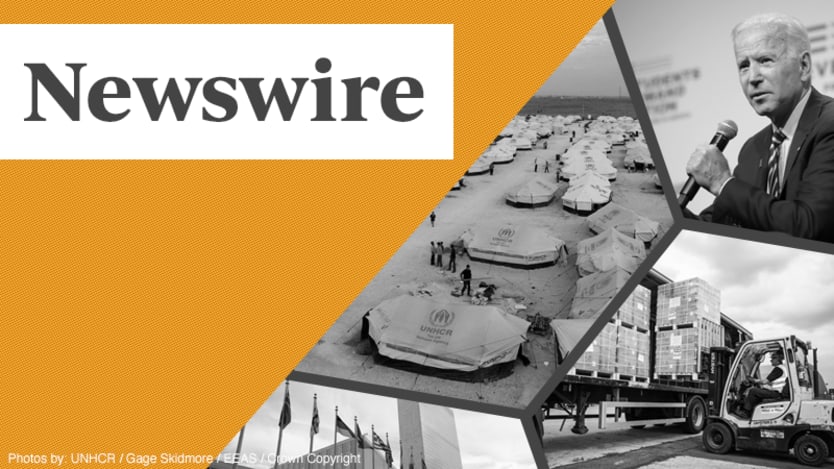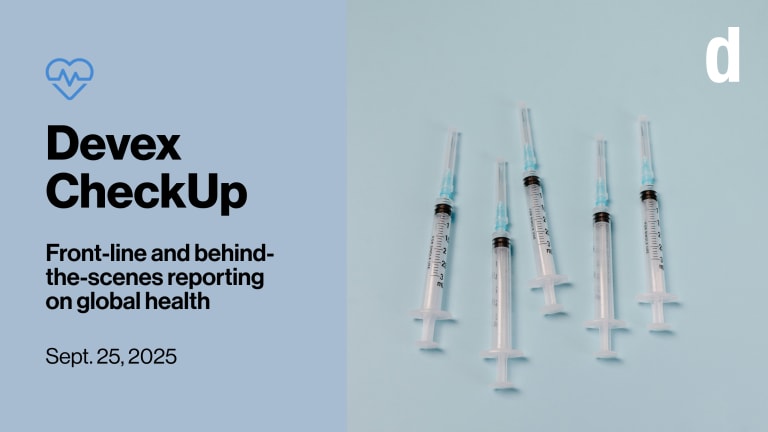Presented by Visa

Is enough being done to fund the global fight against noncommunicable diseases? If the early signs for a new trust fund are any indication, probably not.
Also in today’s edition: Why standardizing nonprofits’ accounting matters, and a World Bank warning on food security.
The noncommunicable disease conundrum
NCDs such as cancer and heart disease kill 41 million people each year and 77% of those deaths are in low- and middle-income countries. Yet, my colleague Jenny Lei Ravelo reports that the Health4Life Fund — a multipartner trust fund established in May 2021 and led by the World Health Organization, UNICEF, and the United Nations Development Programme — is still empty.
This is a preview of Newswire
Sign up to this newsletter for an inside look at the biggest stories in global development, in your inbox daily.
Asked if he’s disappointed with the lack of donor commitment, Dr. Nick Banatvala, head of the Secretariat for the U.N. Interagency Task Force on the Prevention and Control of Noncommunicable Diseases, answers Jenny, simply, “Yes.”
The fund aims to raise $250 million in five years, though for now — despite a few commitments to raise money — Banatvala says that “funds need to come in now speedily so that countries can utilize this.”
For example, Sierra Leone hopes to use the fund to carry out a survey to assess the burden of NCDs across the country, implement tobacco control, and integrate mental health into primary health care. That requires an estimated $2.7 million.
But the potential returns are huge. According to WHO, if LMICs invest an additional $18 billion per year in NCD interventions and treatments, it could generate $2.7 trillion in net economic benefits. Yet for now, only 5% of external aid that goes to health in LMICs is allocated to NCD prevention and control.
And with that, the Sustainable Development Goal of reducing premature deaths from NCDs by one-third seems likely to remain well out of reach.
Read: NCDs are top global killer but fund coffers are empty
+ Jenny is part of our global health reporting team that writes Devex CheckUp, our free, must-read newsletter for front-line and behind-the-scenes reporting on global health. Sign up and receive a copy Thursday.
Need to know …
Here’s a little Tuesday morning quiz:
1) The World Bank’s new senior climate economist is ______ .
2) The African Development Bank’s new director of strategy and operational policies department is ______ .
3) The International Monetary Fund’s new chief of media relations is ______ .
Got to know? Scroll through the bottom to get the answers.
Not boring. Important.
A common set of rules for the accounts of nonprofits around the world — that’s what an international collaboration between nonprofits, standard-setters, and financial professionals is trying to achieve.
It matters — particularly amid the current push for greater localization — because when donors give money to nonprofits in other countries, they need to be able to trust that those organizations are solvent, honest, and able to deliver what’s needed.
But, as my colleague David Ainsworth points out, “If you don’t know what rules were being followed by the people who drew up the accounts, how much can you trust them?”
Enter the International Non-Profit Accounting Guidance, being developed through a collaboration between Humentum and the Chartered Institute of Public Finance and Accountancy, two nonprofits focused on back office costs.
The process began in 2014, and a draft of the guidance is due in November. Then, after comments and revisions, the idea is to have the final version ready by 2025 — and to have 10 countries adopt the guidance by 2030.
And, in case you were wondering, those behind the initiative say that that time frame is quick by accounting standards.
DevExplains: Why nonprofits want an international accounting standard
+ Got something you’d like Devex to explain? Drop us a line at newswire@devex.com.
World Bank’s food security warning
Fertilizer prices are again on the rise and are expected to impact farmer profitability, the World Bank warned in a food security update Monday. Ammonium nitrate jumped higher by 9% and calcium ammonium nitrate soared by 13% in the last week of August.
My colleague Shabtai Gold writes in to report that part of the concern now is that farmers, especially in low-income countries, will plant cash crops rather than staple foods, in order to balance out the cost of fertilizers impacting their bottom line. Last Friday, the International Monetary Fund board approved an emergency financing mechanism for low-income countries to help dull the shocks of rising import and export costs.
Read: IMF scrambles to ease worst food price shock in more than a decade
Read more for Pro: 'We're nowhere near out of the woods' on food price crisis, according to World Bank officials.
+ Not a Devex Pro member yet? Start your 15-day free trial now to read the piece.
Naming names
Here are the answers to the quiz above:
1) Etienne Espagne is joining the World Bank as a senior climate economist.
2) Caroline Kende-Robb has been appointed as the African Development Bank’s new director of strategy and operational policies department.
3) Pierre Mejlak joins the International Monetary Fund as chief of media relations.
We bring you all the latest job moves in our monthly roundup.
Who's who in #globaldev: September 2022 executive appointments (Pro)
In other news
The U.N. has increased its aid appeal for Pakistan to $816 million in an effort to help the country address the rise in water-borne diseases following recent deadly floods. [Reuters]
A new Oxfam report on climate finance at the World Bank found that its reported 2020 portfolio could be off by as much as $7 billion. [Oxfam]
The future of the landmark $8.5 billion climate finance deal to help South Africa transition away from coal dependence becomes uncertain as donor countries express concern over how the fund will be spent. [Bloomberg]
A Debt Justice analysis has found that interest rates on foreign loans have increased globally, with low-income nations being disproportionately affected. [The Guardian]
Shabtai Gold contributed to this edition of the Newswire.
Sign up to Newswire for an inside look at the biggest stories in global development.








